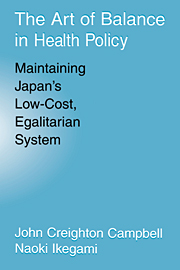Crossref Citations
This Book has been
cited by the following publications. This list is generated based on data provided by Crossref.
Kubota, Kiyoshi
1999.
A design for prescription-event monitoring in Japan (J-PEM).
Pharmacoepidemiology and Drug Safety,
Vol. 8,
Issue. 6,
p.
447.
Campbell, John Creighton
1999.
Long-Term Care for Frail Older People.
p.
135.
Rodwin, Marc A.
and
Okamoto, AtoZ (Etsuji)
2000.
Physicians' Conflicts of Interest in Japan and the United States: Lessons for the United States.
Journal of Health Politics, Policy and Law,
Vol. 25,
Issue. 2,
p.
343.
Anesaki, Masahira
and
Munakata, Tsunetsugu
2001.
The Blackwell Companion to Medical Sociology.
p.
441.
Ohyama, Yoshiharu
Funao, Kazuhiro
Kawabe, Eri
Hayashi, Doubun
Yamazaki, Tsutomu
Iga, Tatsuji
Koide, Daisuke
Ohe, Kazuhiko
and
Kubota, Kiyoshi
2002.
Calcium channel blockers and myocardial infarction: a case–control study in a Japanese hospital.
Pharmacoepidemiology and Drug Safety,
Vol. 11,
Issue. 6,
p.
487.
Chen‐Wei, LIN
2002.
THE POLICYMAKING PROCESS FOR THE SOCIAL SECURITY SYSTEM IN TAIWAN: THE NATIONAL HEALTH INSURANCE AND NATIONAL PENSION PROGRAM.
The Developing Economies,
Vol. 40,
Issue. 3,
p.
327.
Campbell, John Creighton
and
Ikegami, Naoki
2003.
Japan's Radical Reform of Long‐term Care.
Social Policy & Administration,
Vol. 37,
Issue. 1,
p.
21.
White, Joseph
2003.
Three Meanings of Capacity; Or, Why the Federal Government Is Most Likely to Lead on Insurance Access Issues.
Journal of Health Politics, Policy and Law,
Vol. 28,
Issue. 2-3,
p.
217.
Izuhara, Misa
2003.
Social Inequality under a New Social Contract: Long‐term Care in Japan.
Social Policy & Administration,
Vol. 37,
Issue. 4,
p.
395.
Mossé, Philippe R.
and
Takeuchi, Momoe
2003.
Le système de soins japonais : l’impossible et permanente réforme.
médecine/sciences,
Vol. 19,
Issue. 2,
p.
223.
TACHIBANA, Naoko
AYAS, Najib T
and
WHITE, David P
2003.
Japanese versus USA clinical services for sleep medicine.
Sleep and Biological Rhythms,
Vol. 1,
Issue. 3,
p.
215.
Conrad, Harald
2003.
Personalwirtschaftlicher Wandel in Japan.
p.
269.
Wong, Joseph
2004.
The Adaptive Developmental State in East Asia.
Journal of East Asian Studies,
Vol. 4,
Issue. 3,
p.
345.
Mackintosh, Maureen
and
Tibandebage, Paula
2004.
Social Policy in a Development Context.
p.
143.
Hirose, Masahiro
Imanaka, Yuichi
Ishizaki, Tatsuro
Sekimoto, Miho
Harada, Yoshiaki
Kuwabara, Kazuaki
Hayashida, Kenshi
Oh, Eun‐Hwan
and
Evans, S. Edward
2005.
Profiling Hospital Performance of Laparoscopic Cholecystectomy Based on the Administrative Data of Four Teaching Hospitals in Japan.
World Journal of Surgery,
Vol. 29,
Issue. 4,
p.
429.
Mitchell, Olivia S.
Piggott, John
Sherris, Michael
and
Yow, Shaun
2006.
Financial Innovation for an Aging World.
SSRN Electronic Journal,
Bagheri, Alireza
Asai, Atsushi
and
Ida, Ryuichi
2006.
Experts' attitudes towards medical futility: an empirical survey from Japan.
BMC Medical Ethics,
Vol. 7,
Issue. 1,
Sheingate, Adam D.
and
Yamagishi, Takakazu
2006.
Occupation Politics.
Social Science History,
Vol. 30,
Issue. 1,
p.
137.
Imai, Yutaka
and
Oxley, Howard
2006.
Tackling Japan's Fiscal Challenges.
p.
153.
Ikegami, Naoki
2006.
Should Providers Be Allowed to Extra Bill for Uncovered Services? Debate, Resolution, and Sequel in Japan.
Journal of Health Politics, Policy and Law,
Vol. 31,
Issue. 6,
p.
1129.





